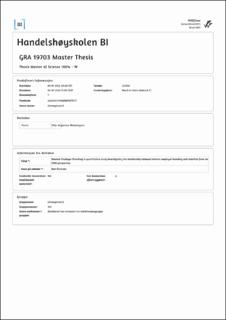| dc.description.abstract | The purpose of the present study was to explore the quality of relationship between perceived internal employer brandings’ employee value propositions (EVP), affective organizational commitment and turnover intention, in addition to if personal characteristics such as educational level influence these relationships. The employee value propositions included in this study is career development, training opportunities and performance appraisals. Previous research has mainly focused on the external perspective of employer branding, resulting in a gap in literature from an internal perspective. Retention strategies are therefore in greater focus in this study, and the goal was to identify the significance of the EVPs included to be able to prevent valuable and hard-to-replace employees from leaving the organization. The retention strategies are therefore how to be affective committed to the organization, as well as what to offer the employees to affect their intent to leave in a positive direction. The study has a quantitative approach, and analysis were carried through based on 219 employees from various organizations in Norway answers in a survey. The analysis showed that employee value propositions had significant positive effect on the relationship with affective commitment. These results indicate that employees that are presented with the employee value propositions perceived their organizations employer brand more positive and it could lead to the employees being affective committed. Career development was found as the strongest relationship to affective commitment, indicating that employees that are presented with this attribute, are more likely to become affective committed. In addition, a strong, significant negative effect was found when analyzing the relationship with turnover intention and EVPs. This indicate that if the employees are not presented with these attributes there is greater likelihood for the employees being intent to leave the organization. There was not found support of educational level as a moderator on any of these relationships. The results are further discussed in comparison to existing literature on the topic, and limitations and suggested further research are presented. | en_US |
